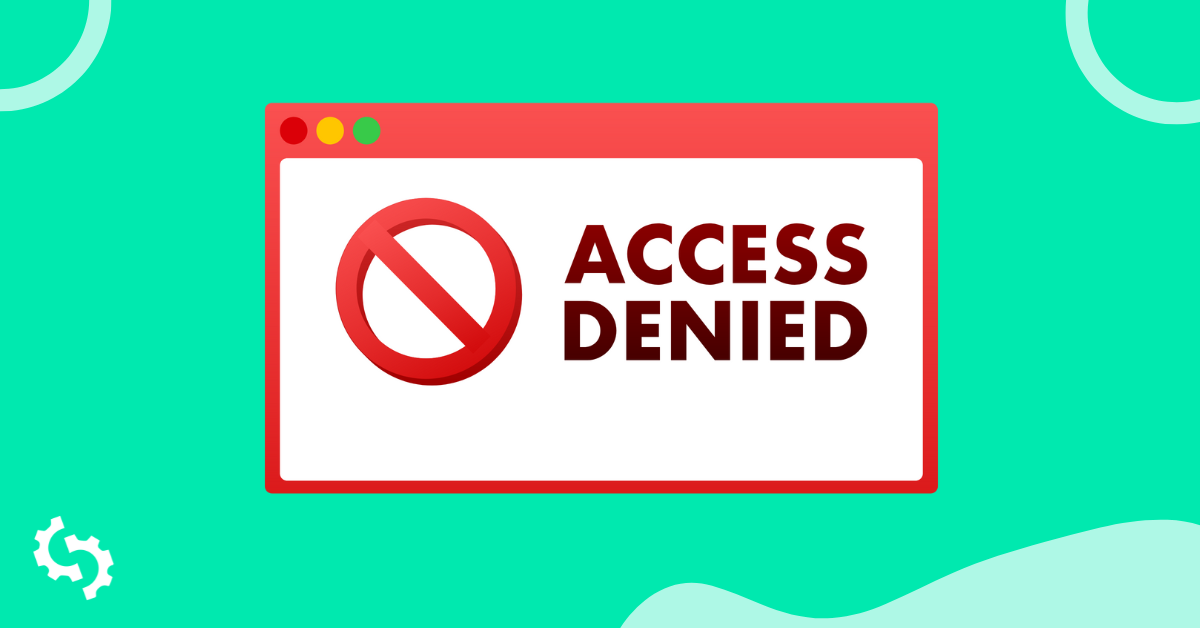
What is Enterprise SEO?
Enterprise SEO relates to the use of powerful software tools to perform advanced SEO auditing, research and site crawling for high-demand use cases typically associated with corporations, multi-site or multi-brand organizations or large agencies.
Most industry experts believe the practice of Search Engine Optimization (SEO) was born around the early 1990's as businesses began to discover the "world wide web".
The idea of enterprise software started to emerge at the turn of the century and ultimately referred to software that performed business functions (like CRMs, and ERPs) for large complex organizations.
These days, when the enterprise label is applied to SEO tools, it refers specifically to SEO software that enables organizations with a sprawling, complex digital presence to audit, report, plan and optimize their SEO activities.
Most SEO tools are built for small businesses and SMEs and this is no surprise when you consider that 99% of businesses in the US are small businesses! (source: Small Business Administration).
Does this mean the Enterprise SEO market represents a measly 1% of American businesses? The answer is a bit more complicated because there are many traditional SMEs that have Enterprise-level requirements.
For this reason, the typical customer for Enterprise SEO tools is less defined by their organization's size and structure but instead defined more by their organization's SEO requirements and the level of complexity across their digital assets.
Features of Enterprise SEO Tools
Enterprise SEO software carries much of the same underlying functionality of similar software aimed at SMBs with the added benefit of managing large volumes of data effortlessly.
It's this factor alone that enables organizations to scale their capabilities and add immense value to their SEO functions.
Site Auditing at Scale
Site Auditing is the process of running a webpage through a series of comprehensive checks such as on-page SEO, backlinks, usability / UX, performance & load speed and social media.
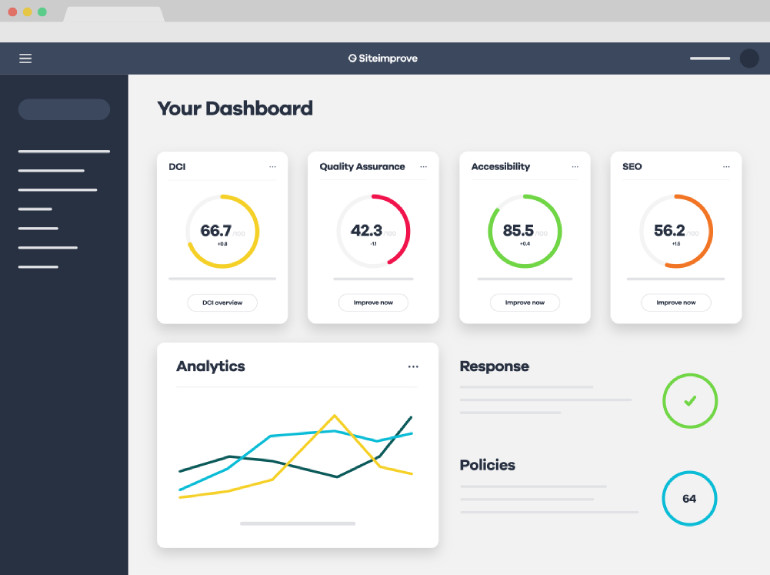
The vast array of site auditing tools on the market let you scan a webpage one at a time whereas in an enterprise context, you can scan hundreds, even thousands of webpages at one and create rules and automations to transform the output into actions.
Advanced On-page SEO Tracking
Accuracy is always important but when operating SEO initiatives at the enterprise level, it's all the more critical. It's often said in the industry that "not all site auditors are the same" which is very true.
This is why large organizations rely on enterprise SEO platforms that assess sites as close to how a human would experience the site.

The most accurate enterprise SEO platforms use advanced Javascript crawling technology to render a webpage in a cloud-based Chrome browser - effectively emulating the human experience.
This is preferable over robotic crawlers which just scan the website's HTML code.
Site Crawling at Scale
Site crawling takes the principles of a site audit on a single page and applies them across a whole website.
In an organization with vast digital footprints encompassing hundreds or even thousands of websites, microsites and local sites - enterprise site crawling can deliver an in-depth level of insight at a fraction of the time it would take a human team to fulfill (minus any human error which is inevitable).

Site crawling can be used to identify deficiencies and problems that you can fix (eg: incorrect title tags, missing meta description & alt tags, broken links, etc) and then aggregate all of these issues in a single list so you can review it in one go and progressively solve each issue.
When you're crawling hundreds or thousands of pages, it's useful to be able to see crawling progress in real-time. So when considering which enterprise SEO tool to use, check whether site crawling shows results in real-time, like SEOptimer's SEO Crawler.
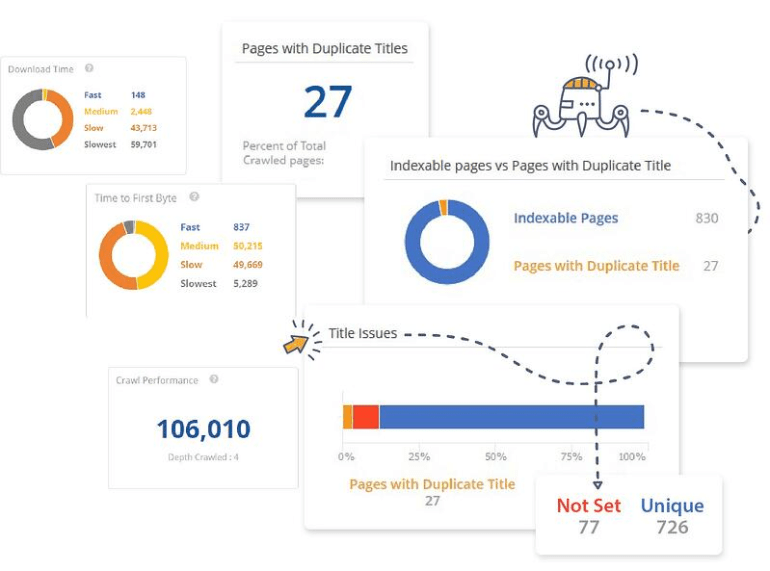
Competitive Analysis
Most management teams are interested in how they compare competitively. This is true across so many business metrics and extends naturally into the world of SEO.
Benchmarking SEO factors such as your search rankings, pageload speed, content quality and user experience are all possible with enterprise SEO software.
On a site-by-site basis, you can compare overall scores and then drill down to individual checks to ascertain which sites perform better than others.
In an enterprise use case, you can export SEO audit report scores and their competitive comparisons all in one data file using Bulk Reporting tools.
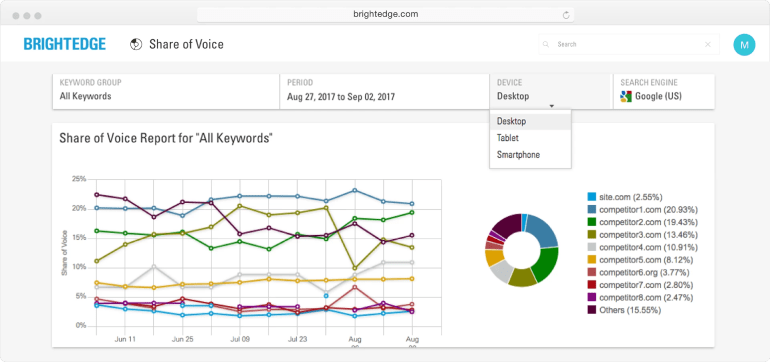
Actionable Insight Identification
Metrics and statistics are great but actionable insights are even better. When you're managing a large digital footprint, you need the capabilities to highlight what needs to be done to make improvements.
This is especially useful if you need to triage tasks to various people or departments internally or even when working with managed service providers.
Multi User Functionality
Another critical feature of an enterprise SEO platform is their multi-user capabilities. This means multiple team members can simultaneously access the platform, allowing for seamless collaboration on projects.
With multi-user access, everyone stays on the same page, ensuring projects progress smoothly. This collaborative environment fosters creativity, encourages cross-functional teamwork, and ultimately accelerates your SEO initiatives.
Multi-user features often include customizable access levels. This means you can assign different permissions to team members based on their roles.
For example, your content writers can have editing rights, while your SEO analysts have full access to performance metrics. This flexibility ensures that sensitive data remains protected while empowering your team to work efficiently.
Integration Capability
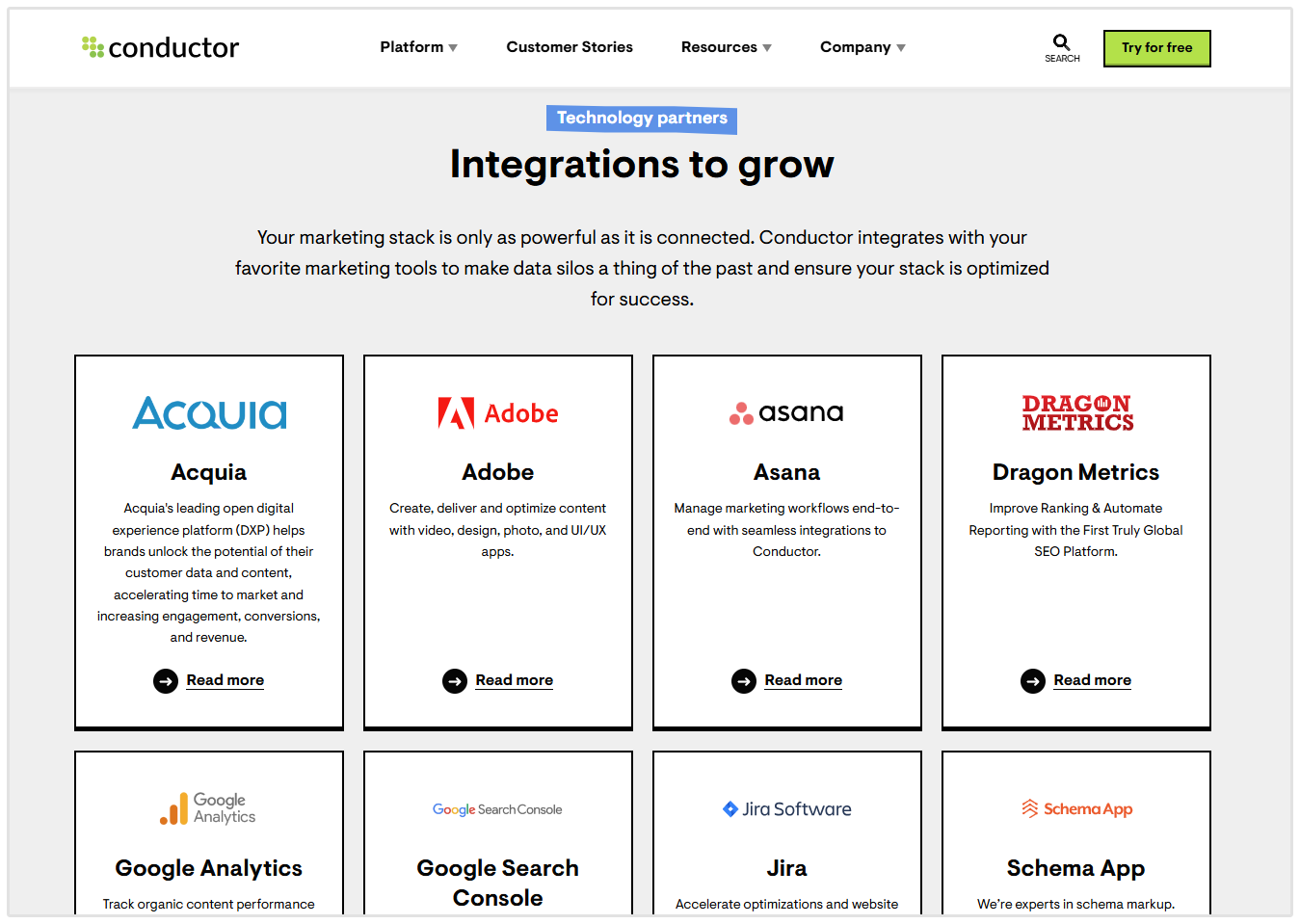
We can't forget integration capabilities. The ability to integrate seamlessly with other platforms is a game-changer for enterprise-level businesses.
Having your SEO data effortlessly synced with your analytics tools, customer relationship management (CRM) system, and content management system (CMS) increases efficiency by streamlining your marketing and sales processes.
This integration streamlines data flow, eliminates silos, and provides a holistic view of your digital ecosystem.
For instance, when your SEO platform integrates with Google Analytics, you gain deeper insights into how organic traffic impacts user behavior on your website.
This insight enables data-driven decisions that enhance user experience and conversion rates. Additionally, integration with CMS platforms like WordPress allows you to directly implement SEO recommendations, speeding up the optimization process.
SEO ROI
Return On Investment. Last but not least, this is arguably the most important concept to communicate to stakeholders.
Proving the ROI on your SEO efforts helps showcase the value your function delivers to the business and can help build the business case for increasing or expanding your remit.
Broadly speaking, ROI is calculated as the gain from the investment minus the cost of the investment divided by the cost of the investment. Your biggest costs or expenses from SEO will likely fall under the following buckets:
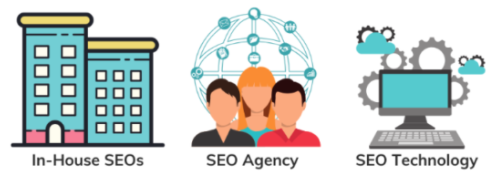
Calculating all your internal and external costs is the easy part. For non-ecommerce businesses, calculating the increase or gain is the tough part.
Because this will be different for every type of organization, it can be beneficial to look at the increase in direct metrics like organic site traffic or organic search impressions and then create a formula for how you represent those with a monetary value.
Tips for Choosing the Right SEO Enterprise Platform
Selecting the right Enterprise SEO platform can make or break your business. With a clear understanding of your business needs and goals, the decision becomes more straightforward. Here are some tips to guide you in this process:
1. Define Your Objectives
Before exploring platforms, identify your specific SEO objectives. Are you focused on improving organic search rankings, boosting website traffic, or optimizing content for conversion?
Knowing your goals will help you evaluate platforms based on their ability to meet your needs.
2. Consider Scalability
Your chosen platform should accommodate your business's growth. Look for solutions that offer scalability, so you won't outgrow the platform as your SEO efforts expand.
Scalability ensures that you can continue reaping benefits from your investment over the long term.
3.User-Friendly Interface
Opt for a platform with an intuitive interface that suits your team's capabilities. A user-friendly design minimizes the learning curve and promotes efficient use. Consider whether your team requires advanced features or a simpler interface for quicker adoption.
The Top 5 Enterprise SEO Platform Vendors
Siteimprove
Siteimprove is a suite of digital marketing products spanning Enterprise SEO, Governance/compliance and analytics.
Their "Digital Certainty Index" is a benchmarking method for websites that enables comparison against a range of industry standards for SEO, accessibility and quality assurance.
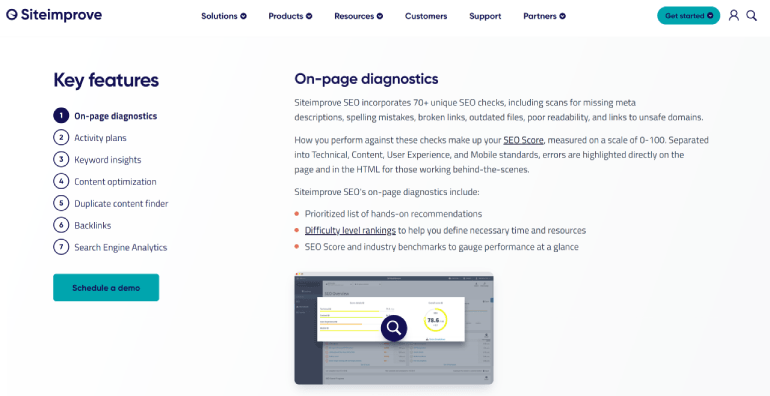
Quality assurance testing is a big focus of Siteimprove and they offer the tools and checks to ensure what they say is a "trustworthy brand experience". Their key features in this area are:
- Readability: identify content depth, use of language and determine whether the content can be understood by visitors
- Content inventory: monitor website updates, page content growth and create a content library with structured categories
- Link and spell check: identify broken links, misspellings and create brand-specific dictionaries.
Siteimprove's customizable dashboard reports provide site managers with a library of over 650 widgets to build customized dashboards.
This is particularly useful when you need to report to different stakeholders in different ways. We know some people are more visual and like in-depth charts and graphs, whereas others prefer short executive summaries.
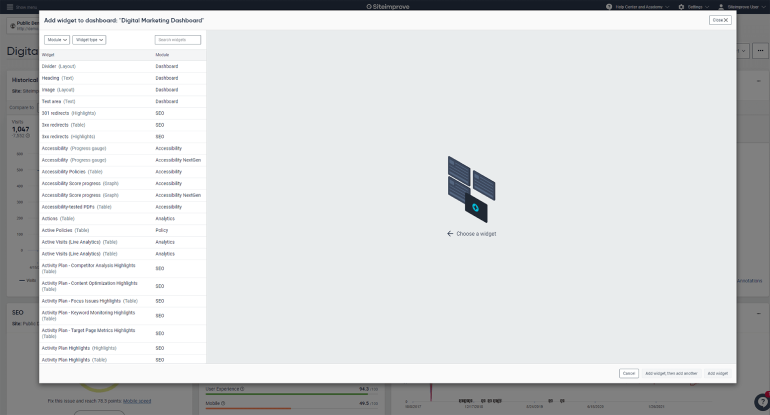
Siteimprove boasts over 7,500 clients and has an average user rating of 4.6 out of 5 stars on G2 from 249 reviews.
Conductor
Conductor is part software, part service with the ability to provide the tech as well as interpret results and provide SEO strategy.
Conductor has an analyst team who can also help execute specific queries or answer questions relating to SEO data.
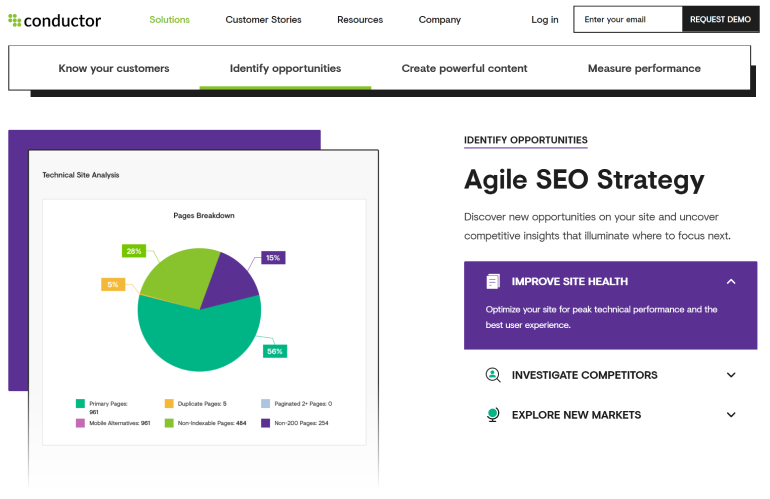
Conductor's strategy team can be embedded into client teams and help with a range of services including:
- Weekly strategy and working sessions
- Custom solutions and reporting
- Team training and workshops
- 24-hour weekday technical support
- Team enablement services
- Product training and advanced implementations
Conductor's service model is not based on billable hours but instead based on deliverables. These deliverables are defined and included as part of their license agreement. Custom deliverables can also be 'ordered' ad-hoc from their Solutions Marketplace:
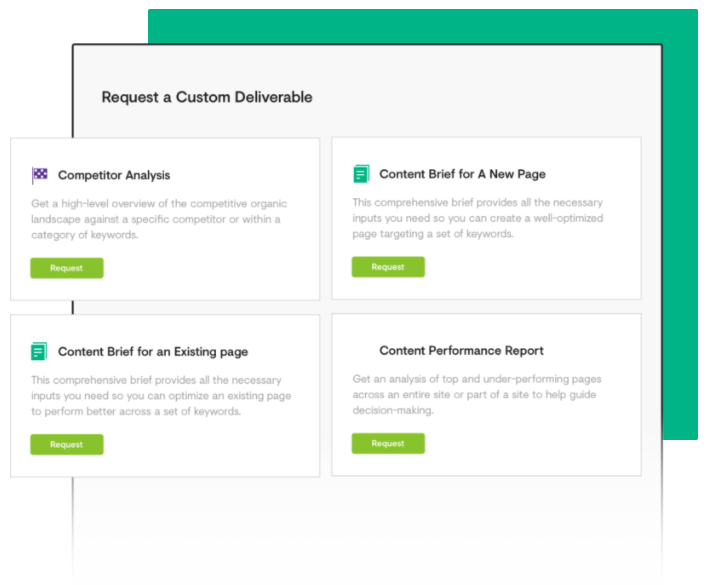
Conductor lists enterprise SEO clients such as Citibank, Samsung, Slack and Shiseido. Conductor has an average user rating of 4.5 out of 5 stars on G2 from 255 reviews.
BrightEdge
BrightEdge is another suite of enterprise SEO tools for all facets of SEO including keyword tracking, content & site auditing, business intelligence, competitive analysis and more.
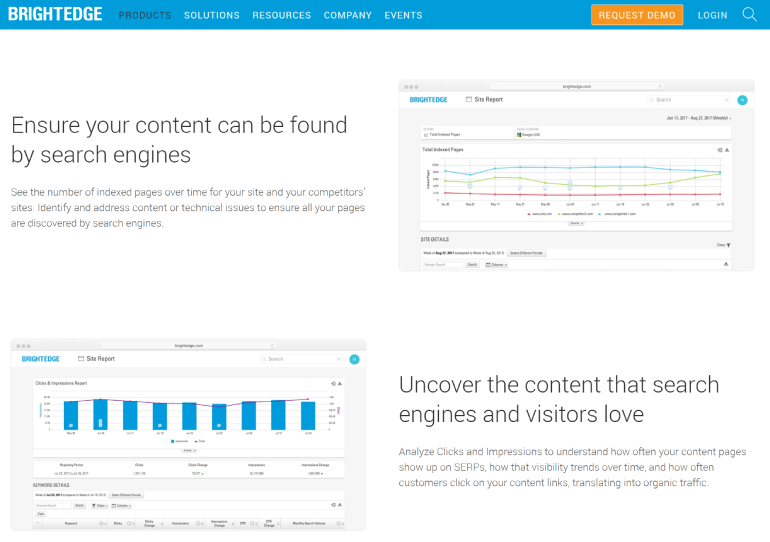
BrightEdge's tech is powered by DataMind - their proprietary deep learning marketing technology.
The promise of DataMind is to deliver data-driven decision making based on pattern recognition algorithms that instantly identify consumer search trends, competitive threats and market shifts in real-time:
With this focus on machine learning, BrightEdge helps their customers to stay ahead of market changes and leverage opportunities that would have otherwise gone unnoticed.
BrightEdge lists 64 of the Fortune 100 as customers and has an average user rating of 4.3 out of 5 stars on G2 from 182 reviews.
seoClarity
seoClarity is an enterprise SEO platform with an AI-enabled insights engine they call Clarity Grid. Like Conductor, seoClarity also provides a range of services on top of the software.
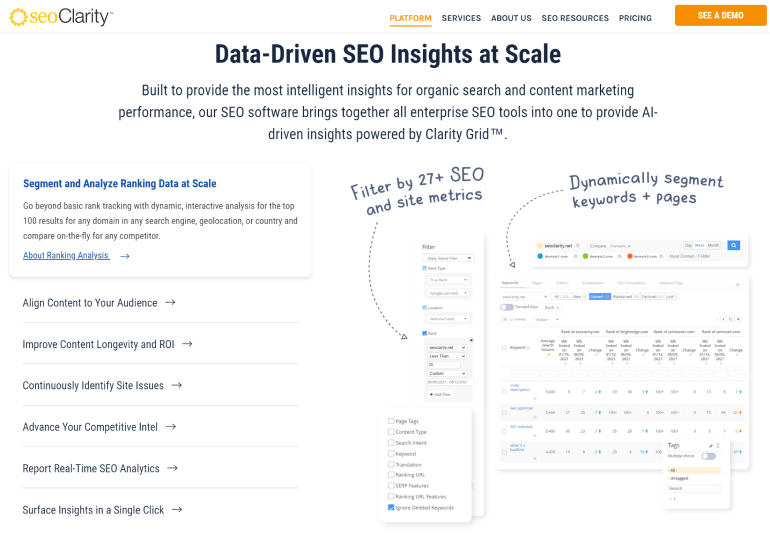
In addition to SEO strategy and custom solutions, seoClarity's services team can even brief writers and product content for you, essentially fulfilling the role of a content agency.
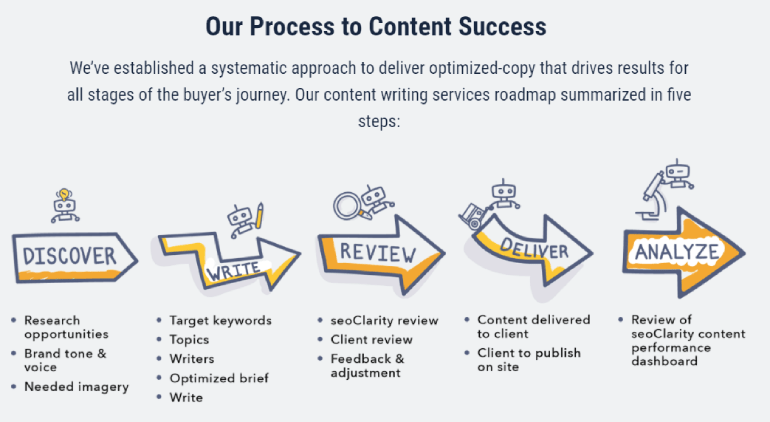
But if you want to develop your own content in-house, seoClarity's Content Ideas product will help accelerate your brainstorming. Content Ideas is the largest data set of Google's "People Also Ask" section.
The tool applies natural language processing (NLP) to recognize context and provide users with high value keywords, long-tail opportunities and trending topics based on real searches performed on Google:
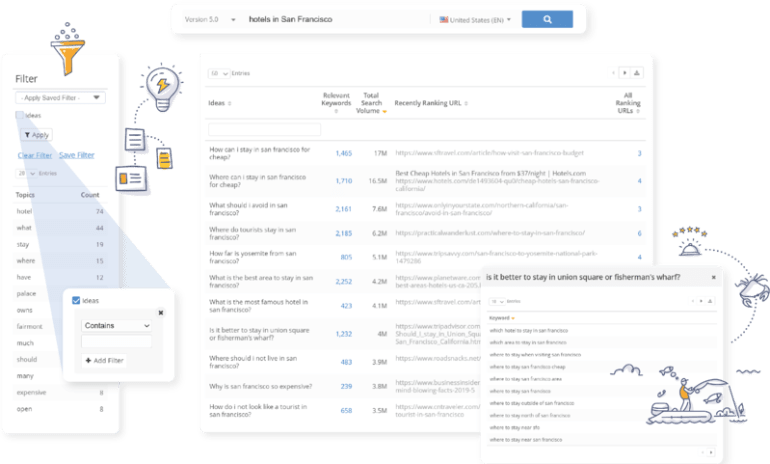
seoClarity is one of the more established enterprise SEO platforms having been around since 2007 but has an average user rating of 4.5 out of 5 stars on G2 from just 28 reviews.
Shameless plug: SEOptimer
SEOptimer's origins were in SMB (small to medium business) clients but over time with more functionality added over the years, the platform has expanded to encompass enterprise SEO software requirements.
Because of this, SEOptimer is a lower-cost alternative compared to the tools above but it carries much of the same powerful functionality.
SEOptimer's expansion to enterprise functionality started with the launch of SEO Audit API. This powerful resource enables developers in agencies or in-house teams to access site auditing functionality via JSON:
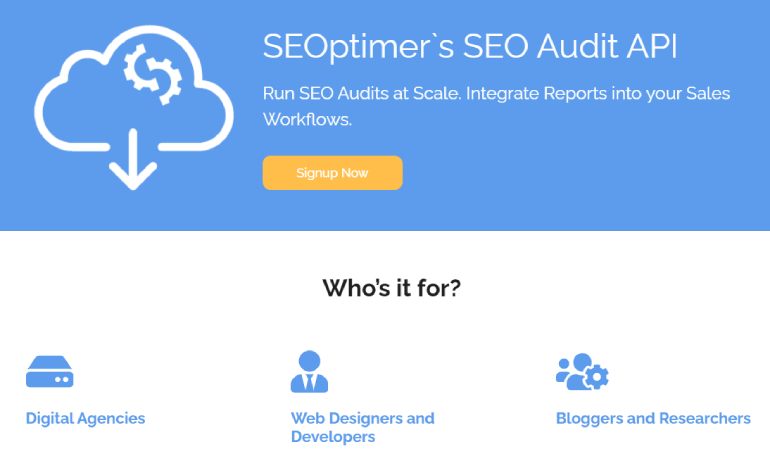
SEO API users can retrieve individual site audit data points and scores or retrieve white label PDF reports too. With over 50 data points, SEOptimer's SEO Audit API is flexible and powerful to enrich custom-built applications or power advanced sales workflows.
Following on from SEO API, SEOptimer launched Bulk Reporting functionality and a Zapier app to connect SEO data outputs to other systems without the need for API integration:
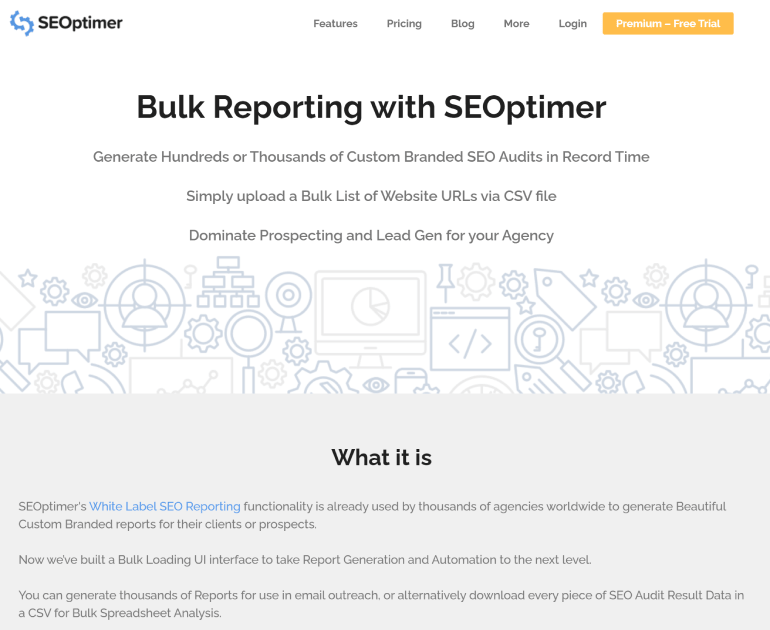
Today, SEOptimer serves advanced digital agencies running automated lead gen at scale and over the years has generated over 200,000 new business leads for agencies around the world.
SEOptimer has an average user rating of 4.7 out of 5 stars on G2 from 76 reviews making it the highest-ranked by customers among the enterprise SEO tools listed in this guide!
If you are interested in scheduling a demo of SEOptimer in your organization, reach out on live chat (in the bottom right-hand corner).
Benefits of Enterprise SEO for Your Organization
For all the digital marketing stats and trends, there is one that we come back to constantly:
93% of online experiences begins with a search query.
This astounding statistic proves that SEO is paramount to the success of organizations online.
Furthermore, with 92% of the search engine market share, Google is undoubtedly where most web users begin their sessions. The argument for most SMEs is usually quite clear.
Small business owners tend to understand the value of Google and most are acutely aware of Google's direct impact on their traffic, leads or sales.
But ask the C-Suite in any large organization boardroom what their SEO strategy is and you'll likely get blank looks.
Granted, not all high-profile brands require a strong SEO strategy due to sheer market presence, but most large organizations benefit from SEO.
In this guide, we'll cover some of the typical use cases for Enterprise SEO platforms and why they're as important for large organizations as they are for small businesses.
Enterprise SEO in Franchise Businesses
Franchise organizations are the perfect hybrid of enterprise+smb requirements since they consist of one or multiple headquarters (franchisor) surrounded by a vast network of individually owned operators (franchisees).
For example, Anytime Fitness, the largest fitness franchise in the world consists of over 4,700 individually owned gyms globally with head office locations in most countries they operate in.
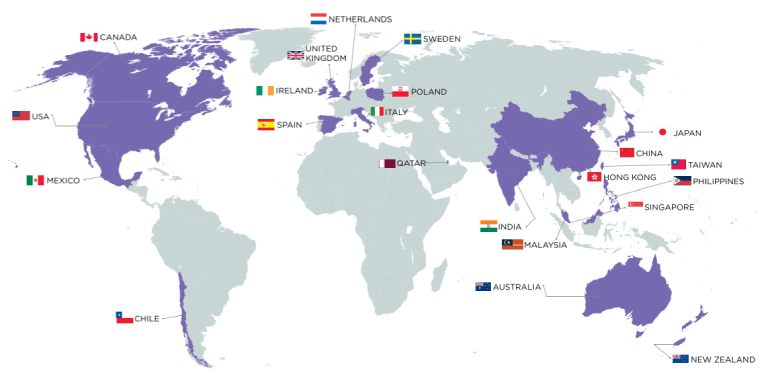
Every single gym competes in their local city/suburb on a hyper-local level and is essentially a small business.
But behind each of these thousands of small businesses are sophisticated country-based head offices that manage the resources and requirements of the group.
Let's take this Anytime Fitness example further and zoom into the gym at Santa Clara in California:
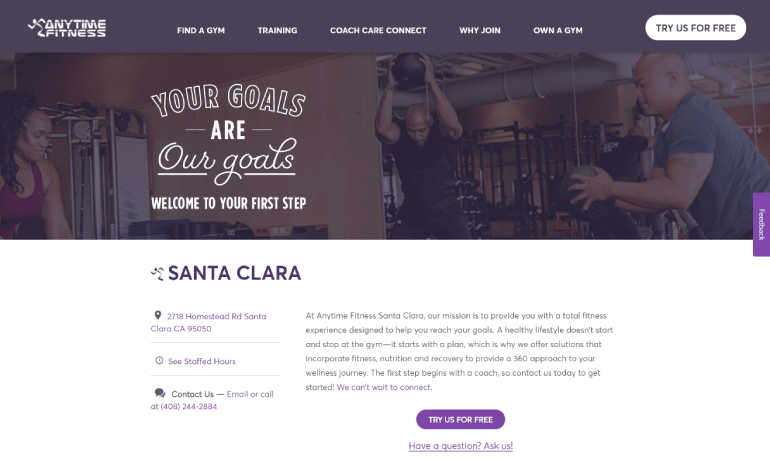
Although each franchisee doesn't have a completely separate website, they do have a separate landing page. In this instance: https://www.anytimefitness.com/gyms/2980/santa-clara-ca-95050/
Not only is there the website but the gym's individual social media accounts for Facebook, Instagram and YouTube.
Practically, when we think of the local customers in and around the Santa Clara area, the landing page and social channels need to compete against all other gyms for visibility in search engine results.
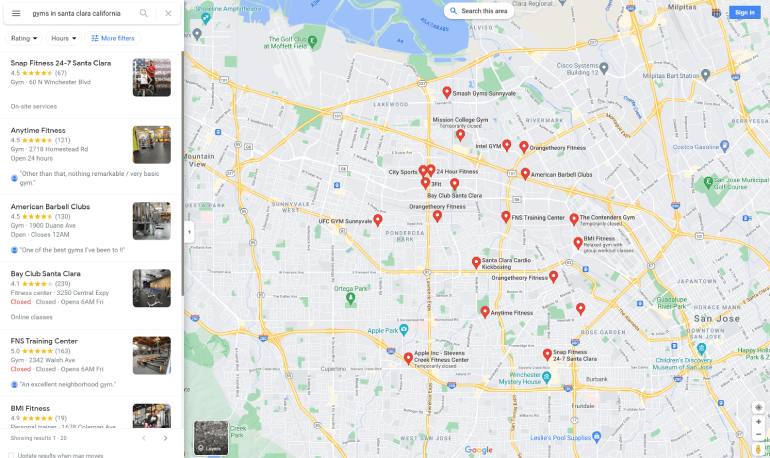
If we can make a few assumptions, the local owner/manager at Anytime Fitness Santa Clara will be very interested in how they rank (and what they need to do to rank higher).
As will the Anytime Fitness United States HQ in Minnesota - they'll be equally interested in these insights too, just multiplied by hundreds, potentially thousands of other local locations.
This kind of scale needs Enterprise SEO software to audit thousands of websites, track local level keyword rankings and deliver optimization recommendations at the local level.
This one example in the world of fitness is replicated among many industries like real estate, restaurants, home services, human resources, healthcare, travel - the list goes on!
Enterprise SEO in Multi-Site and Multi-Brand Businesses
Holding companies or parent business entities typically have a need for Enterprise SEO tools since they manage a portfolio of brands.
Unlike the example above, these brands may compete in completely different sectors and they are likely to be wholly or partially owned and operated by the holding company.
These types of holding companies don't traditionally sell or make anything themselves. Instead, their brands operate and interface with customers.
Below is an example of Nestlé, a well-known global holding company that wholly or partially owns consumer brands in several non-competing verticals:
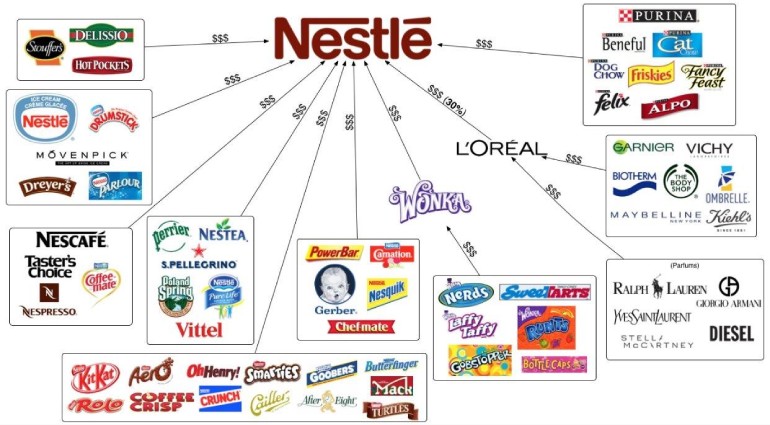
Depending on the size of the group, each individual brand may run it's own digital marketing department autonomously. Alternatively, the digital marketing function might be centralized in the company's headquarters.
In either case, enterprise grade SEO platforms might be utilized in several different ways across the group.
In this instance, an efficient solution would be a shared service digital marketing function run out of headquarters that can audit, track, report and optimize all SEO strategies globally while local offices can access these insights and operate their own local SEO requirements - all within the one enterprise SEO tool.
Enterprise SEO for Advanced Agency Lead Generation
Digital agencies form the bulk of SEOptimer's customer base. Although the vast majority of digital agencies are small and mid-size (headcounts under 50), we see large agency groups utilizing enterprise SEO software specifically for lead generation.
Lead generation isn't the traditional use case for SEO tools however the functionality offered in enterprise platforms provides the ideal functional mix and utility for agencies to scale their new business prospecting in a cost-efficient and highly automated fashion.
How it works is based almost entirely on automating site audits. The digital agency produces white label SEO site audits for hundreds, even thousands of websites and uses these powerful assets to prospect directly with site owners and business owners.
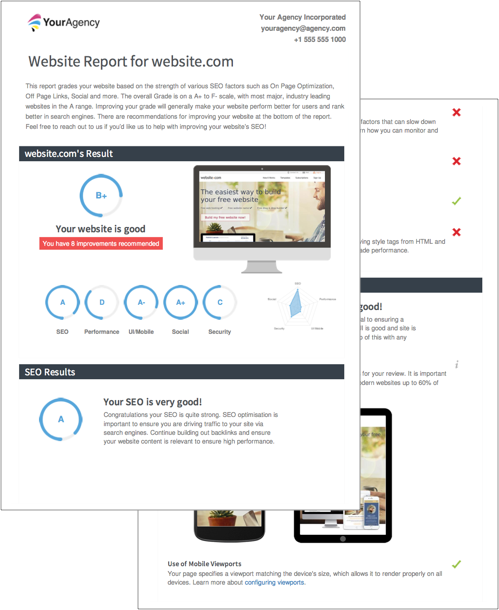
Some agencies build their own or use off-the-shelf prospecting tech to filter and identify target URLs of appropriate businesses.
Then they use Enterprise SEO APIs or Bulk Reporting tools to generate all the reports and provide back JSON data (in the API example) or prospect-ready PDF audit reports (in the Bulk Reporting example).
It's worthwhile to note that this kind of workflow is not exclusive to the realm of large sophisticated agencies. In fact, small agencies can leverage this exact same technology to rapidly scale their lead generation.
It all comes down to the agency's lead gen strategy and go-to-market plan.
Enterprise SEO for Multi-Region Businesses
Global businesses and brands have unique SEO requirements due to the complexities of cross-border business. One of the biggest challenges is language.
Enterprise SEO tools can help these types of businesses run site audits and track search rankings in most of the main languages spoken around the world. For example, SEOptimer provides multi-lingual keyword tracking in over 70 countries.
Audit reports can be localized to match user locale settings and delivered in a range of languages for non-English speaking marketers.
This is all the more important these days where the developing world are joining the web at an increasing rate due to the ubiquity of the internet and the proliferation of low-cost mobile devices. For most of these users, English is not their native language.
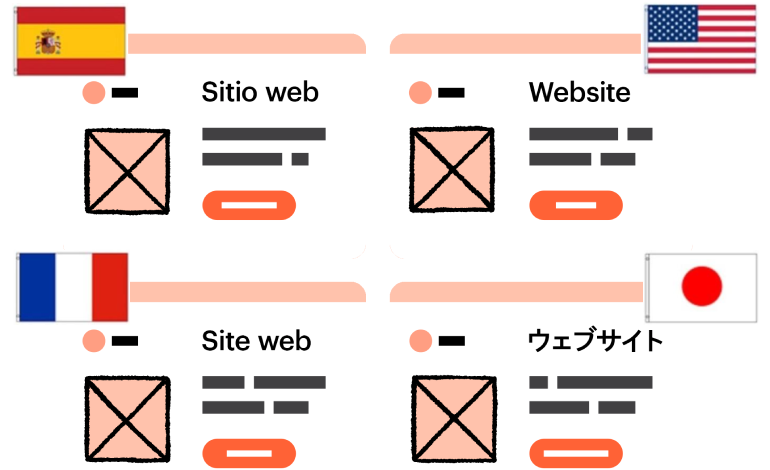
Language aside, the need for internationalization on the site through hreflang, ccTLD's (country-specific domains) or sub-domains introduces a whole new dimension to an enterprise SEO strategy.
Similar to the requirements of a multi-brand organization, multilingual SEO structures can scale in complexity quickly which is why a clear plan underpinned with the right enterprise SEO platform will help manage everything.
Do You Need Enterprise SEO Software?
If your can relate to any of the organizational structures mentioned at the start of this guide or if you require the types of capabilities listed above, there's a very good change you'll need an enterprise SEO tool in your organization.
But simply selecting a tool and implementing it is not enough.
In an interview with Crowd Favorite, SEO Specialist Rebecca Gil from Web Savvy Marketing described the challenge of enterprise SEO broadly in an organization:
"In an enterprise organization, you have lots of different people doing lots of different roles. SEO is really an organizational issue and problem and challenge. It's not just departmental or even individual."
In most cases, building the business case is step 1. Your ability to get buy-in across the whole organization will radically impact the success of your endeavors.
"The enterprise as a whole needs to back the SEO process, the strategy, the planning, and needs to understand what's happening in the world around you today and not be based on education from five years ago, because you'll quickly get outdated."
As Rebecca says, education is key especially in the ever-evolving world of SEO. Proactively educating management and stakeholders will help unlock opportunities and highlight problems that need solving.
Bespoke Enterprise SEO vs Off-the-Shelf
Some organizations decide to go it alone and build their own bespoke tech. This is a big undertaking and it's a fairly uncommon approach but for organizations with the technical talent in-house, this is nevertheless an option to consider.
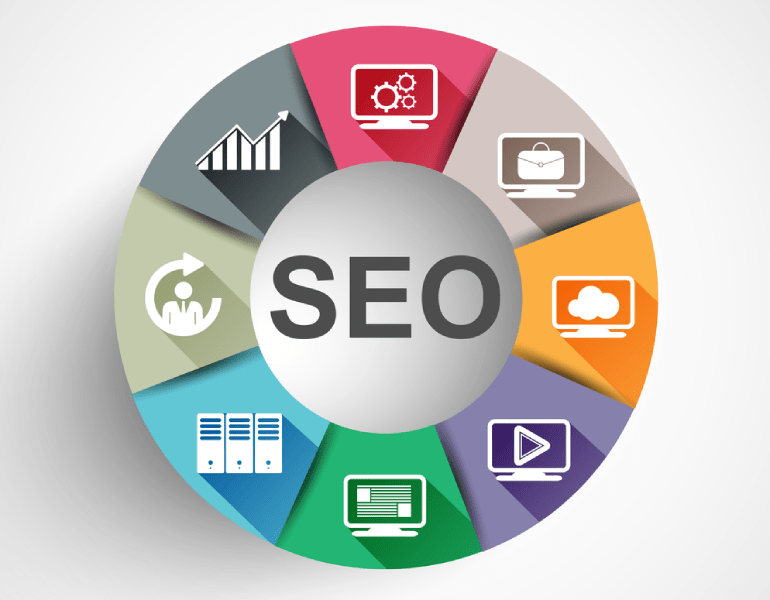
Perhaps the biggest benefit of building your own solution is that you can design it from the ground up to suit your specific needs.
If you (or your team) are technically inclined SEO Explorer wrote a full walk-through guide covering how to build your own SEO tech which runs through APIs, scraping, crawlers and more!
Transitioning from SMB SEO Tools to Enterprise SEO Tools
You may find yourself in a situation where you outgrow the capabilities of your current SEO software and need to step up to enterprise-level functionality. This can occur in any of the following situations:
- Launch or acquire new products or services
- International expansion
- Marketing department personnel change
- Change in objective / strategy
- Organic growth
- Competitor activity
If you've outgrown your SMB SEO tool, first explore what options they may provide since some tools span all sectors of the market and provide entry-level functionality all the way up to enterprise (like SEOptimer).
But if you've reached the ceiling of functionality with your current toolset, explore some of the options we outlined above.
Frequently Asked Questions
What is an Enterprise SEO Platform?
An Enterprise SEO platform is a comprehensive software solution designed to optimize and manage large-scale search engine optimization efforts for businesses.
Unlike basic SEO tools, these platforms offer advanced features tailored to the needs of complex organizations. They provide insights into various aspects of SEO, from technical audits to content optimization and competitor analysis.
What's the Difference Between Enterprise SEO and Local SEO?
While both Enterprise SEO and Local SEO aim to boost online visibility, they cater to different scopes and audiences.
Enterprise SEO focuses on optimizing large websites with diverse content and target audiences. It's ideal for businesses with national or international reach, seeking to establish authority across various search engines.
On the other hand, Local SEO targets specific geographic areas. It's designed for businesses with a local presence, such as retail stores, restaurants, or service providers.
Local SEO strategies include optimizing Google My Business listings, managing online reviews, and creating location-specific content. The goal is to attract nearby customers searching for products or services in their vicinity.
Next Steps
If you or your organization is in the market for enterprise SEO software, consider running trials and demos of multiple tools so you can understand how they solve your specific challenges.
Customer review sites like G2 are also great for understanding how these tools compare and what your peers value the most.



